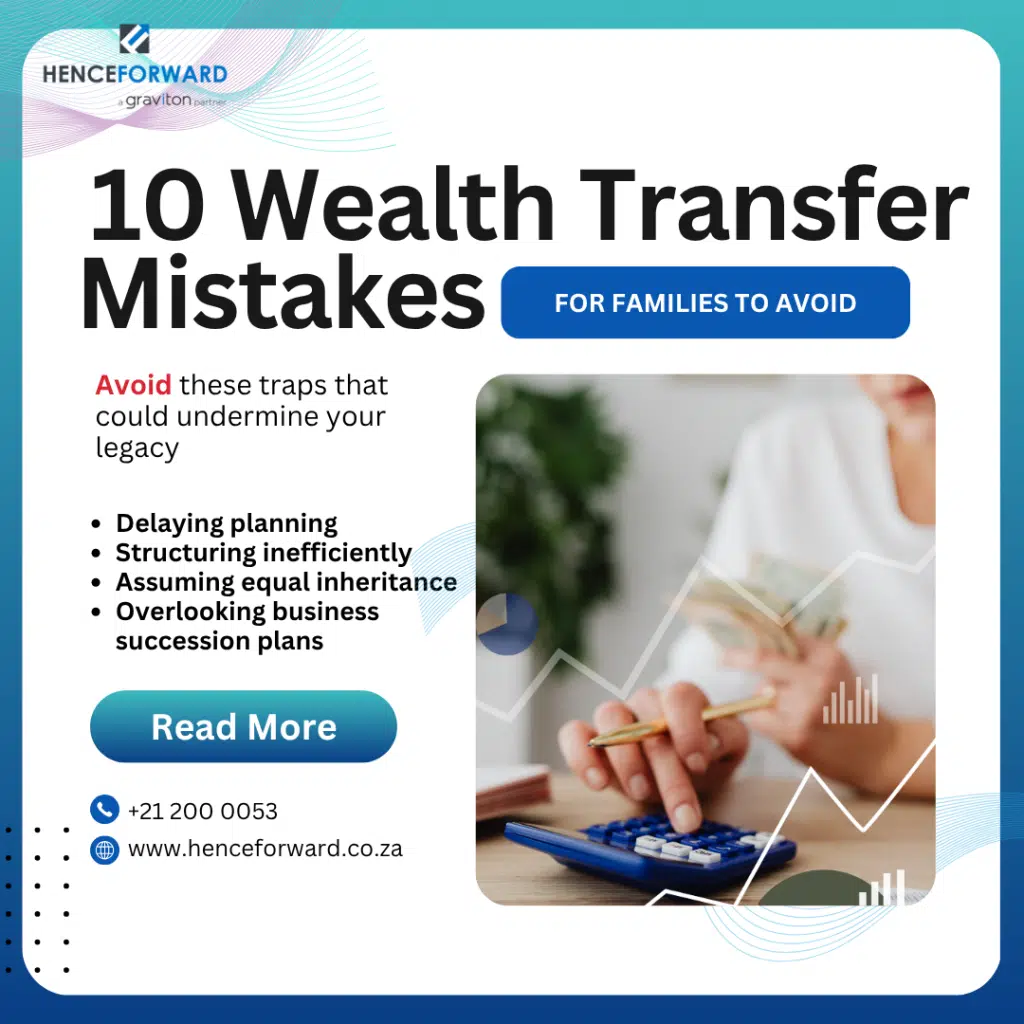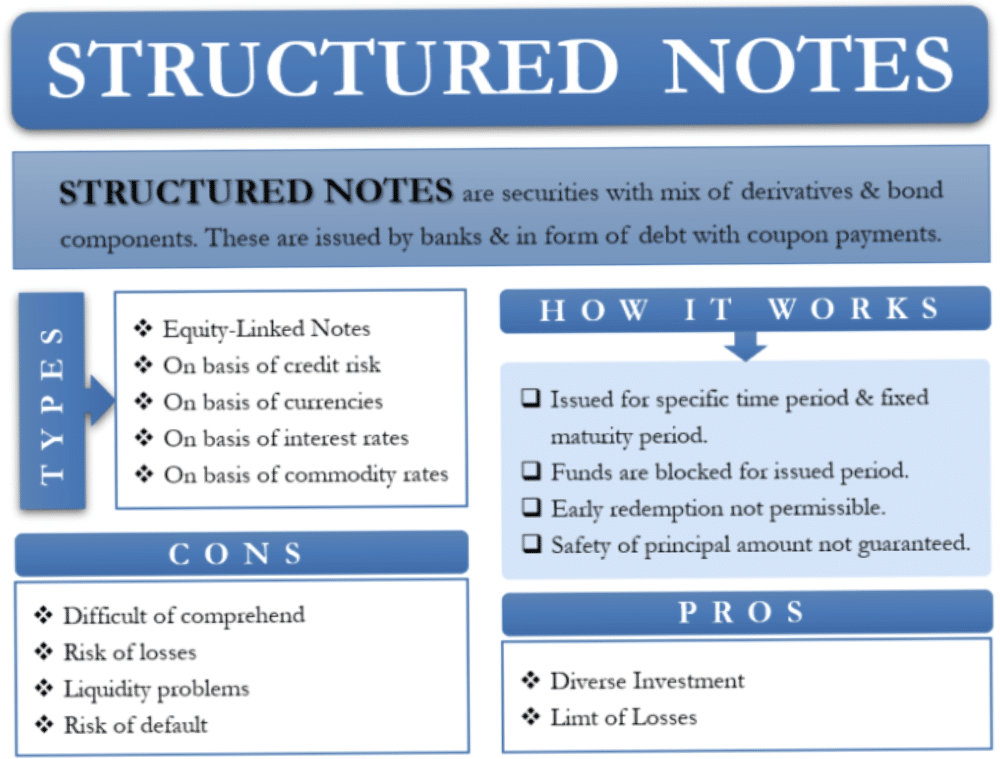Last Updated on 16/06/2025 by Carl-Peter Lehmann
Top 10 Wealth Transfer Mistakes Families Make: Wealth transfer isn’t just about passing on money — it’s about preserving values, empowering the next generation, and avoiding unintended conflict. Yet many South African families still fall into common traps that undermine their legacy. Whether you’re a first-generation entrepreneur, a high-net-worth individual, or a family office stewarding multigenerational wealth, avoiding these 10 mistakes is key to a smooth transition.

1. Delaying the Conversation Until It’s Too Late
Too many families postpone estate conversations until someone passes away or becomes incapacitated. This leads to confusion, conflict, and delayed administration. A 2023 Sanlam Wealth Index revealed that only 27% of South African high-net-worth individuals have discussed their estate intentions with heirs.
Tip: Proactive, transparent communication is essential. Host a family meeting to share your intentions and values — not just the numbers.
2. Failing to Update Wills and Estate Plans
Wills drafted 10 years ago often don’t reflect current realities — including new marriages, divorces, children, assets, or business structures. Sometimes even asset values rapidly increasing create other unforeseen issues such as estate duty.
Example: A Cape Town entrepreneur passed away in the pandemic without a a golden thread between his will, family trust and business. The result : his wife having to blindly put the pieces of the puzzle together without the picture on the box.
Tip: Review your estate plan every 3–5 years, or after any major life event.
Do Read: The importance of having a will and how to structure one effectively
3. Structuring Assets Inefficiently for Tax and Estate Duty
Unstructured investments and properties held in your personal name can result in unnecessary estate duty, capital gains tax, and executor fees.
Tip: Consider tax-efficient vehicles such as inter vivos trusts, endowments, or donations to Public Benefit Organisations (PBOs), which can reduce your estate’s tax burden.
Further Reading: Your Ultimate Guide to Estate Planning in South Africa
4. Not Planning for Liquidity
Many estates are “asset rich but cash poor,” with properties, farms or shareholdings that can’t be easily liquidated. This forces heirs to sell valuable assets just to cover estate costs.
Tip: Perform a liquidity audit. Life cover, offshore cash reserves, or local investment portfolios can be earmarked for estate duties, executor fees, and bequests.
5. Overlooking Business Succession Planning
If you own a business, who will lead it when you’re gone? A lack of succession planning risks the collapse of the business — and the family’s wealth.
Example: A Western Cape entrepreneurs successful business closed overnight. There was no one with the authority to act on behalf of the business which lead to contract losses, and cash flow issues immediately. His heirs were unprepared and had no management plan in place.
Tip: Formalise succession with buy-and-sell agreements, management training, and a transition roadmap for continuity.
6. Assuming All Children Should Inherit Equally
Equal inheritance is not always fair. One child might run the family business while another received financial support through university or property.
Tip: Use letters of wishes or family charters to explain decisions, and consider documenting past financial assistance or sweat equity.
7. Ignoring Cross-Border Considerations — Especially with UK-Based Heirs and Global Assets
Modern families are global — but many still only have a South African will. This can create massive complications if you hold foreign assets or have heirs living overseas.
Foreign Assets and the “One Will” Problem
Even owning Apple or Tesla shares via a global investment platform can trigger situs tax and probate requirements in the US. These shares are considered US-situs assets and, for non-residents, can attract US estate tax at 40% on estates exceeding $60,000. That’s right — only $60,000.
Your executor may also need to initiate probate in the US, delaying distributions and increasing costs. The same is true for UK property, EU bank accounts, or Australian superannuation, which all fall outside the scope of a South African will unless explicitly included.
The 6 April 2025 UK Tax Changes
The UK is scrapping its “non-dom” regime. From 6 April 2025, UK tax residents who’ve lived there for more than four years will be taxed on worldwide income and gains, regardless of where the funds are located.
This directly affects South African families with:
- Offshore life-wrapped investments (e.g. Old Mutual International or Glacier International)
- Foreign trusts or endowments
- Global share portfolios
Example: A Durban-based couple leaves an Isle of Man investment wrapper to their daughter, who has lived in London since 2017. After April 2025, HMRC can tax the full proceeds — even if they remain offshore. If the wrapper is held in trust, punitive UK anti-avoidance rules could apply too.
Tip:
- Review whether you need separate wills in other jurisdictions.
- Work with a cross-border fiduciary team to ensure your global estate is structured to avoid probate delays, tax leakage, and double taxation.
- Consider clean capital planning and restructuring wrappers
8. Neglecting the Emotional and Relational Aspects
Wealth can unite — or divide. When inheritance expectations go unspoken, even close families can fall into conflict.
Tip: Create a family charter or legacy letter that communicates your values, vision, and intent behind financial decisions. This builds understanding across generations.
9. Assuming a Trust Will Solve Everything
Trusts are powerful tools, but not silver bullets. Poorly managed or outdated trusts can trigger adverse tax consequences, fall foul of legislation, or lose family trust (pun intended).
Tip: Ensure your trust deed is up to date, your trustees are capable and independent, and the purpose of the trust remains aligned with your legacy goals.
Further Reading: Using Trusts as Effectctive Estate Planning Tools
10. Not Seeking Professional Advice Early Enough
Too many families rely on generic wills or cookie-cutter advice from professionals who don’t specialise in estate structuring or cross-border tax.
Tip: Engage a multi-disciplinary team — fiduciary, legal, tax, and financial planning — to build a custom, futureproof estate plan.
Further Reading: How to help your child pay off their home loan without triggering donations tax
Frequently Asked Questions About Family Charters for South African Families
-
1. Is a Family Charter legally binding in South Africa?
No. A Family Charter is not a legal document and cannot override your will, trust deed, or company memorandum. However, it works alongside legal structures by providing clarity on family values, expectations, and governance — reducing disputes and misunderstandings.
-
2. Who should be involved in creating a Family Charter?
Ideally, all key family stakeholders should be involved — including wealth creators, spouses, adult children, and sometimes even the next generation. The process works best when it is inclusive and guided by a neutral facilitator.
-
3. Can a Family Charter help avoid family conflict after death?
Yes. While it can’t guarantee harmony, a well-crafted charter significantly reduces conflict by documenting shared values, clarifying intentions, and establishing clear governance. It can prevent misunderstandings about “who gets what” and “why.”
-
4. How often should a Family Charter be reviewed?
We recommend reviewing your Family Charter every 2 to 3 years, or after any major family event (such as a death, marriage, divorce, or the sale of a family business). It should evolve as the family and its assets grow.
-
5. What’s the difference between a Family Charter and a will?
A will is a legal document that directs how your assets are distributed when you die. A Family Charter, on the other hand, is a strategic and values-based framework that guides how the family relates to its wealth and each other — across generations.
-
6. Can a Family Charter include rules for the family business or trust?
Absolutely. Many Family Charters outline who may work in the family business, how trustees or directors are selected, and how decisions are made. While it doesn't replace legal agreements, it sets the tone and expectations for those involved.
-
7. Do all wealthy families need a Family Charter?
Not necessarily — but any family with shared assets, a trust, business, or multiple heirs can benefit immensely. It is particularly valuable for first-generation wealth creators, blended families, or those wanting to build a legacy beyond money.
How Henceforward Can Help
At Henceforward, we guide South African families through the complexities of intergenerational wealth transfer — from estate planning and trust structuring to cross-border advisory and family charters.
We help families avoid conflict, minimise tax, and preserve legacy through tailored planning that reflects their values, not just their balance sheet.
Let’s start your legacy conversation.
Final Word
Successful wealth transfer isn’t just about who gets what — it’s about ensuring your life’s work benefits the people and causes you care about, without confusion, delays, or disputes.
Plan early. Communicate clearly. Structure wisely.

Steven Hall
Steven is a CERTIFIED FINANCIAL PLANNER® and Director at Henceforward. With over two decades of experience in financial planning, Steven is passionate about helping families secure their legacies through thoughtful estate and succession planning. He works closely with clients to ensure their wealth serves both current needs and future generations, all within a clear, values-based framework.





